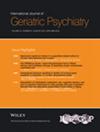Experiences and Management of Distress and the Use of Music, Including Music Therapy, on NHS Inpatient Mental Health Dementia Wards: A Qualitative Study
Abstract
Background
Inpatient mental health dementia wards in the National Health Service (NHS) provide specialist care for people with dementia experiencing acute levels of distress. There is little research exploring how best to manage and prevent distress. Music therapy may be feasible to deliver and reduce the prevalence of distress behaviours.
Aims
To further understanding of experiences of distress in inpatient mental health dementia NHS wards, how distress is managed and ways music and music therapy is used.
Methods
Semi-structured focus groups and interviews were co-designed and conducted with people with dementia, families, staff, music therapists and managers with experience of this setting. Data were transcribed and analysed using reflexive thematic analysis, with findings corroborated with participants, a co-design group and experts-by-experience.
Results
49 people took part from 17 wards. Three overarching themes were identified, with 10 subthemes. The first theme highlighted the complex physical and mental health care needs of people on these wards, including high levels of distress. Secondly, staff and families aimed to personalise care to manage and prevent distress. Thirdly, music, including music therapy, could support the delivery of personalised care and help prevent and deescalate distress behaviours, potentially reducing the need for restrictive interventions. However, managers, staff, families and patients reported that care provision did not always meet patient need and resource limitations often prevented delivery of personalised care.
Conclusions
NHS mental health dementia wards provide specialist care for people with dementia experiencing high levels of distress. Personalised care, including the use of music, was essential for preventing and managing distress, and could be enhanced through specialist support from a music therapist. Findings should inform best practice guidelines for NHS inpatient mental health dementia wards, including the use of music and music therapy, to support the prevention and management of distress for this client group.


 求助内容:
求助内容: 应助结果提醒方式:
应助结果提醒方式:


